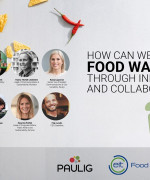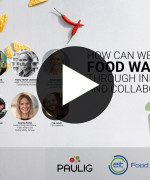Event description
Food waste is a significant environmental, economic and societal issue within the EU and beyond. The European Commission has proposed the setting of legally binding food waste reduction targets to be achieved by Member States by the end of 2030, aiming for a 10% reduction in processing and manufacturing and 30 per cent (per capita) jointly at retail and consumption.
This webinar enabled key decision-makers and industry representatives to discuss the pressing issue of food waste, exploring innovative solutions, discussing co-operative practices and addressing the importance of policy to drive change. The discussion included considerations such as implications for consumers as well as company learnings and best practices. The event was organized by EIT Food, Europe’s leading food innovation community, and Paulig, an international food and beverage company.
The discussions included considerations such as implications for consumers as well as company learnings and best practices. The event was organized by EIT Food, Europe’s leading food innovation community, and Paulig, an international food and beverage company.
Rewatch the webinar
Key takeaways
- Collaboration is essential across the entire value chain, no single stakeholder can solve the issue of food waste on their own
- Price and convenience are significant drivers of consumer behaviour, and policies should be implemented to make sustainable choices more affordable and accessible
- Encouraging consumers to take a second look at ‘best before’ dates and assess food quality before discarding items can play a crucial role in cutting down on unnecessary waste
- Continued innovation and knowledge sharing among stakeholders are vital for exploring and addressing the multifaceted issue of food waste
Event speakers & panelists
- Moderator: Susan Cloran, MBA, RD(SA/UK), Senior Vice President, Eat Well Global
- Rolf Ladau, Chief Executive Officer, Paulig
- Marja-Liisa Meurice, Director EIT Food North and East Region
- Anne-Laure Gassin, Team Leader, Food Waste, Farm to Fork Strategy Unit at the Directorate-General for Health and Food Safety of the European Commission
- Susanne Knittel, Head of Corporate Affairs, Public Affairs and Sustainability at Danone
- Mattis Bergquist, Head of Sustainability, Coop
- Hanna Thofelt-Lindstrom, Head of Communications and Sustainability at Matsmart Matatos
- Kaisa Lipponen, Senior Vice President, Communications and Sustainability at Paulig
Detailed summary
Today, one third of all food produced worldwide is wasted, amounting to 1.3 billion tons of food. This represents a significant environmental, social and economic issue, as it involves the squandering of natural resources, money, and time. In Europe alone, 132 billion Euros are wasted on food waste annually and this is happening in parallel to the 37 million European citizens that cannot afford a high-quality meal every second day. To address this, the European Commission has adopted a legislative proposal, as part of a revision of the Waste Framework Directive, which calls for the setting of legally binding food waste reduction targets to be achieved by Member States by 2030. According to the proposal, Member States should reduce food waste by 10% in processing and manufacturing and by 30 per cent jointly in retail, restaurants and food services and households by 2030.
Reduction of food loss and waste is supported by 140 European associations and companies that have signed the EU Code of Conduct on Responsible Food Business and Marketing Practices. Fighting food waste requires a systemic approach, involving all players in- and outside the food value chain. Innovative collaboration – including developing partnerships as shown today - and enhancing business practices can play a key role in reducing food waste for a sustainable future, and this was evidenced from the panelists part of the webinar.
One of the key points raised during the discussion was the need for collaboration across the entire value chain, as food waste is a complex issue that cannot be solved by any single stakeholder. Instead, it requires a holistic approach, combining the efforts of producers, retailers, consumers, and policymakers. Three action areas were outlined that businesses can focus on to address some of the major issues:
- Address the businesses own operations and manufacturing processes
- Align on an approach with suppliers and business
- Collaborate with charities and companies, both local and international, to donate and redistribute food, particularly items with intact quality nearing the best-before date or featuring slight appearance imperfections (e.g., in packaging).
There is a sense of urgency throughout the industry to tackle this issue, particularly regarding the high price of food leaving so many people hungry.
Innovation was also a theme in the discussions. Whether it is utilizing technology at the shop level to improve the handling of stock or developing cross-industry relationships to upcycle waste into stand-alone by-products without compromising food safety, all panellists emphasized the importance of considering the entire value chain in the fight against food waste. By working together and sharing ideas, stakeholders can develop effective strategies to reduce waste and promote a more sustainable food system.
It was noted that the blame of food waste issue often falls at the feet of the consumer, and whilst this is only part of the problem, there are methods to address consumer behaviour that could significantly reduce it. Since price and convenience are significant drivers of people's choices, both company policies and regulatory measures should be implemented to make sustainable choices more affordable, as this would encourage consumers to opt for less wasteful options.
There was also discussion around the importance of re-evaluating the concept of "best before" dates, with suggestions that these dates should be stretched to reduce unnecessary waste. It was stressed that food is not waste until it becomes waste, and consumers could be reminded to visually assess, smell, and taste the quality of food items reaching or past the best before dates before discarding them solely based on the date. Another very important aspect is to inspire consumers to fully utilize ingredients and to create new dishes with leftovers that might otherwise be wasted.
Throughout the webinar, all the panellists expressed their enthusiasm toward the European Commission's proposal to set these legally binding food waste targets, agreeing that policy and regulations would go a long way to reward responsible business and consumer behavior, and significantly step up the efforts to tackle food waste.
The webinar concluded with the panellists highlighting the biggest shifts that need to take place to reduce or eliminate food waste. There is a need to work together across the entire value chain to address the global challenge of food waste. By sharing data, setting common objectives, and implementing policies that encourage sustainable choices, stakeholders can make significant strides in saving money, reducing waste, and promoting the transition to a sustainable food system. A triple win.
Along with the panel discussion, the webinar also featured talks from three innovative business owners, leading the charge against food waste:
Juan Medina, Co-founder & CEO, Kaffe Bueno
Kaffe Bueno is a Danish bioscience company, dedicated to upcycling coffee by-products into sustainable resources across various industries. Rooted in innovation, sustainability, and the power of coffee, Kaffe Bueno stands at the forefront of bioscientific advancements, driving positive change for both industries and the planet.
www.kaffebueno.com
Olaf van der Veen, CEO, Orbisk
Orbisk is a startup on a mission to make the world’s food system more sustainable. They do this by using progressive and innovative technology to tackle one of today’s biggest challenges: food waste. The solution provides hospitality organizations with a complete insight into their food waste and help them cut it in half, taking maximum use of recent developments in computer vision and AI.
www.orbisk.com
Filip Lundin, CEO, Sopköket (The Waste Kitchen)
Sopköket is a Swedish culinary innovator committed to salvaged ingredients, meal donations, and job creation. Pioneering a comprehensive waste management approach, Sopköket's primary goal is to minimize food waste, targeting a minimum of 50% rescued ingredients in every meal. Sopköket operates its restaurant and catering business in Stockholm, Sweden.
www.sopkoket.se
For more information, please contact:
Nils Sjöberg
Communications Manager Sweden
nils.sjoberg@paulig.com
+46 70 085 24 11
About Paulig
Paulig is a family-owned food and drink company, growing a new, sustainable food culture—one that is good for both people and the planet. Paulig provides all things tasty: coffees and drinks, Tex-Mex and spices, snacks and plant-based choices. The company’s brands are Paulig, Santa Maria, Risenta, Poco Loco and Zanuy. Paulig’s sales amounted to EUR 1.1 billion in 2022. The company has 2,300 passionate employees in 13 different countries working to fill life full of flavour.


